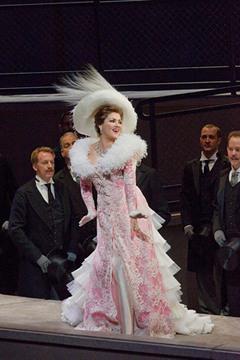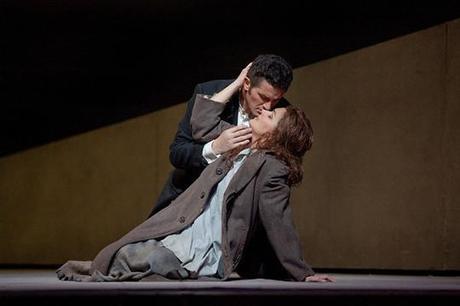Manon and the male gaze
Photo (c) Ken Howard/Met Opera
Massenet's Manon, an opera about sex, scandal, and social status--oh, and true love--revolves around the character of its title heroine, and around others' perceptions of her. Manon is described as a sphinx even by her lover Des Grieux, and treated as a creature of caprice, but Laurent Pelly's production makes her a passionate young woman who pursues her own goals, playing perilous games with a hypocritical society. Maybe it was partially the updating to the 1880s which made me see the Manon of this production as a figure parallel to De Maupassant's Georges Duroy (
Bel Ami): a provincial set on conquering Paris, an individual of insignificant antecedents but extraordinary personal beauty, for whom sex is not only a sensual pleasure, but a weapon of social conquest. The tone of Pelly's production seemed, like the opera's heroine, to hesitate between laughter and tears without quite knowing why. The voyeurism of male(-dominated) society was highlighted, as were Manon's resolute attempts at self-assertion within that society. But despite the near-ubiquity of sinister
flâneurs, the trio of Poussette, Javotte, and Rosette were played as straightforwardly comedic, and even Guillot and de Bretigny were relatively non-threatening. In short, the production, while not devoid of style or ideas, did not always seem to have the courage of its convictions.
Fabio Luisi's leadership of the Met orchestra was light of touch, and sensitive to the quicksilver undercurrents in the score. Even when Massenet's characters dissemble, his orchestra reveals what they are thinking and feeling; Luisi and the Met forces did so with subtlety nearly always, and with well-timed escalations of passionate intensity. I especially appreciated the nuanced handling of the frequent ostinati in the strings, and the fine work of the woodwinds throughout. Anne-Carolyn Bird, with an agile, bright soprano and vivid presence, made a memorable Poussette. The Guillot of Christophe Mortagne was another standout: Mortagne sang with bright tone and assured diction, and acted with comic opera flair.
David Pittsinger sang the Comte des Grieux with consistently elegant phrasing and rich, expressive sound; his Act III scene with Beczala was notable for its emotional nuance. Paulo Szot sounded somewhat grainy, but made a charismatic (and thoroughly caddish) Lescaut.
As the young nobleman Des Grieux, who desires Manon yet seems incapable of accepting her on her own terms, Piotr Beczala gave the most vivid and nuanced dramatic performance I've seen from him. Unfortunately, he seemed to be having an off night vocally, sounding pushed at the top of his range, and lacking the easy phrasing I usually associate with him. (
Olivia Giovetti's report from the opening night of the run suggests Saturday's performance was anomalous.) Beczala's Des Grieux was ardent and sympathetic; over the course of the opera, he comes to understand better how Manon's philosophy of life and love differs from his own, and by Act V, he loves her without illusion and without selfishness, singing the final scene very movingly. Anna Netrebko gave a diva's performance, commanding attention from the moment she entered the scene. Her Manon is a young woman very sure of what she wants--to see the world, and the people in it--and sure that she won't stand for being tied to an institution, whether that institution is a convent or marriage. Enthusiastic and eager for experience in the first two acts, she is clearly aware of and exhilarated by the dangerous games she is playing in the third and fourth. Both she and Des Grieux have gained emotional wisdom, as well as bitter experience, by the last act; but Manon's attempts at social and sexual independence have been brutally crushed. At this stage of her career, Netrebko's voice is unusually dark and full for the role. If this resulted in less agility than she has brought to it in past incarnations, Netrebko's singing was nonetheless richly expressive. I loved the zest and playfulness she brought to her opening aria. Many of Act II's difficult decisions are read in Netrebko's face even during the amorous exchanges with Des Grieux; when she is finally left alone, "Adieu, notre petite table" is heartbreaking. In the third act, Manon is clearly enjoying her power, but also aware of the fragility of its foundations. Netrebko's prayer in Saint-Sulpice ("Pardonnez-moi, Dieu de toute-puissance") was impassioned and mesmerizing. Once she's told God that she's taking Des Grieux back, the success of telling Des Grieux himself the same thing seems a foregone conclusion. It also makes sense of how she fondly recalls her lover's cassock in their final scene. By the fifth act, Manon may have been brutalized, but she is still herself, and not ashamed.



